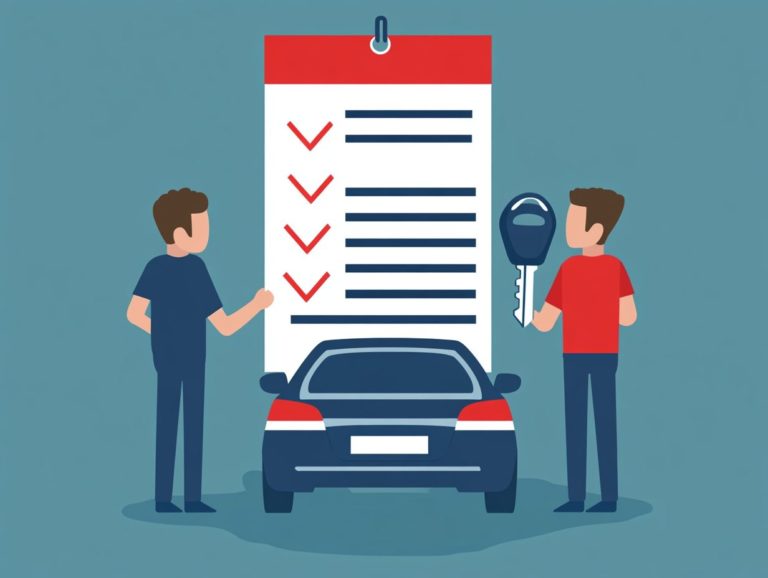Understanding New Car Financing Options
Navigating the world of car financing can be daunting, especially with so many options available.
Whether you’re considering a traditional loan, exploring leasing, or looking into dealer financing, each route has distinct advantages and challenges. This article simplifies the various types of car financing, highlights essential factors to evaluate before making your decision, and offers strategies for securing the best deal.
This article also helps you avoid common mistakes that can cost you money. Explore these insights and seize the chance to make the best choice for your next vehicle!
Contents
- Key Takeaways:
- What is Car Financing?
- Types of Car Financing
- Factors to Consider Before Choosing a Financing Option
- How to Get the Best Financing Deal
- Common Mistakes to Avoid in Car Financing
- Frequently Asked Questions
- What are the different types of financing options available for buying a new car?
- How does a car loan from a bank or credit union work?
- What is dealership financing and how does it differ from a traditional car loan?
- What are the benefits of leasing a new car?
- Can I negotiate the financing terms when buying a new car?
- What factors should I consider when choosing a new car financing option?
Key Takeaways:

- Understand the different types of car financing options like traditional loans, leasing, and dealership financing.
- Consider factors such as your credit score and total costs before selecting a financing option.
- Negotiate with dealers and compare offers to get the best deal while avoiding hidden fees and unclear loan terms.
What is Car Financing?
Car financing includes various financial options for individuals who want to buy a vehicle without paying the full price upfront. This process involves working with lenders like banks, credit unions, and dealerships to secure an auto loan or lease that fits your financial situation. To navigate this better, it’s helpful to explore understanding the new car buying process.
It s crucial to understand the terms involved like interest rates, loan amounts, and credit scores so you can make informed decisions about your financing options.
Types of Car Financing
Many car financing options are available, each designed to meet specific financial needs and preferences. For a deeper insight, consider understanding used car financing options, including traditional loans, leasing agreements, and dealership financing.
Understanding these categories is essential for choosing the financing method that aligns with your budget and long-term goals. This knowledge enables you to accurately calculate monthly payments and total interest, setting yourself up for financial success.
Traditional Loans
Traditional loans for car financing involve borrowing a specific amount from a lender, such as a bank or credit union, which you then repay over a set loan term, usually spanning three to seven years. To ensure you’re making the best choice, it’s crucial to consider understanding the fine print of new car deals. Your credit score significantly impacts this process, influencing the interest rate you’re offered and your monthly payments.
Generally, the better your credit score, the lower the interest rate you re likely to secure, leading to considerable savings over the life of the loan. Lenders also consider other factors like their fees and the amount you owe compared to the car’s value, which can affect your total costs. For example, maintaining a lower amount owed compared to the car’s value could result in better loan terms.
Unlike other financing options, traditional loans come with the benefit of ownership. As you make payments, you build equity in your vehicle, ultimately giving you a tangible asset at the end of the term.
Now that you know your options, take the next step and find the best financing deal for you!
Leasing
Leasing a vehicle presents a compelling alternative to purchasing, allowing you to experience the thrill of driving a new car while enjoying lower monthly payments compared to traditional financing methods. This arrangement involves a contract for a specific period, where you, as the lessee, pay for the vehicle’s depreciation and usage costs during the lease term, all while not acquiring ownership of the vehicle itself.
As you navigate this process, you ll want to carefully review key components, including lease terms that typically range from 24 to 60 months. This ensures that your monthly payments fit seamlessly into your budget. Leasing often results in a lower overall cost of ownership, as you don’t have to worry about losing money over time like traditional buyers.
While the allure of driving the latest models equipped with cutting-edge technology and lower initial cash outflows is certainly enticing, it s crucial to weigh the potential drawbacks, such as mileage limits and possible fees for excessive wear and tear. Ultimately, grasping these dynamics enables you to make informed decisions regarding your vehicle financing options.
Dealer Financing

Dealer financing stands out as a popular choice for those looking to purchase a vehicle directly from a dealership. You have the option to secure financing either through the dealership itself or via third-party lenders. Often, this route comes with enticing financing specials tailored to appeal to consumers, but it’s vital to keep an eye on the interest rates and terms, particularly in light of your credit history.
By choosing this financing method, you can frequently enjoy a more streamlined purchasing process, often paired with promotional rates designed to encourage a purchase. You can also learn about understanding your rights in car financing while negotiating the vehicle price and financing terms in one convenient setting.
While this may appear advantageous, it s essential for you to compare offers from multiple lenders. Doing so can unveil hidden fees or less-than-favorable interest rates that might not be immediately obvious. This underscores the importance of conducting thorough research before finalizing any agreements.
Factors to Consider Before Choosing a Financing Option
When you’re contemplating car financing, it’s crucial to think about key factors to make informed decisions about your options. Consider your credit score, interest rates, and the total cost associated with understanding the different types of car loans and various loan terms.
These considerations will enable you to assess your budget effectively and choose the financing method that best suits your vehicle purchase.
Credit Score and Interest Rates
A borrower’s credit score plays a pivotal role in the world of car financing, impacting not only the interest rates you can access but also the loan amounts you might qualify for with various lenders. Understanding how credit scores relate to interest rates is essential if you re aiming for favorable financing terms.
Your credit score is calculated based on several factors, including:
- Payment history
- Credit utilization (how much of your available credit you are using)
- Length of your credit history
A higher score often results in lower interest rates, which can substantially decrease the overall cost of financing your vehicle. On the flip side, a lower score could lead to higher rates, possibly limiting your chances of securing a loan amount that meets your needs.
You can improve your credit health by making timely payments, reducing outstanding debts, and regularly checking your credit reports for inaccuracies. By implementing these strategies, you position yourself for better loan opportunities that align with your financial goals.
Start reviewing your options today to find the best deal!
Monthly Payments and Total Cost
Monthly payments and the total cost are crucial elements of car financing. They directly impact your budget and financial well-being.
A well-calculated monthly payment is shaped by the loan term and interest rates. This ensures you can manage your expenses while keeping the vehicle’s value intact.
Understanding how these payments are computed is vital. They come from the total loan amount, which includes the purchase price, fees, interest rate, and loan duration.
As you budget, keep these factors in mind. Higher interest rates or longer loan terms can lead to increased monthly costs and a heavier total repayment amount.
Over time, the significance of these figures deepens. Cumulative interest can be a significant portion of the total cost.
Consider exploring refinancing options in the future. Securing a lower interest rate could lead to savings and enhance your financial health.
How to Get the Best Financing Deal
Securing the best financing deal for your car purchase requires a strategic approach. Conduct thorough research and improve your negotiation skills to understand various lenders’ offers, especially when considering used car financing.
You ll want to look into obtaining preapproval. It streamlines the loan application process and boosts your bargaining power.
Negotiating with Dealers

Negotiating with dealers is key to car financing. It helps you secure favorable terms and financing specials that lower your overall costs.
Before visiting the dealership, gather insights on current market rates and available incentives. This preparation allows you to identify realistic offers and counter inflated prices.
Establish a clear budget before negotiating. Adhere to it to ensure you make informed decisions that advocate for your financial interests.
Comparing Offers from Lenders
Comparing offers from various lenders is essential for borrowers seeking the best car financing options. Differences in interest rates and loan amounts can lead to significant cost variations.
To make informed decisions, gather detailed offers from multiple lenders. This enables you to conduct a side-by-side comparison.
Pay close attention to the Annual Percentage Rate (APR). It includes the interest rate and any associated fees, giving you a clearer picture of your total payment.
Understanding the total loan amount is crucial. A lower interest rate might lead to higher payments in the long run if the loan term is extended.
Evaluate the overall cost of financing carefully. This ensures you secure a deal that genuinely benefits you.
Common Mistakes to Avoid in Car Financing
Navigating car financing can lead to common traps. These can result in less-than-ideal terms and higher costs.
Stay vigilant about hidden fees and fully understand loan intricacies. This awareness is vital for securing a beneficial financing arrangement.
Overlooking Hidden Fees
Overlooking hidden fees is a common pitfall in car financing that can dramatically inflate the total cost of your loan. These sneaky fees may crop up during the loan application process as lender fees or other financing-related costs that might not be immediately obvious.
Many borrowers miss these additional charges, which can include origination fees the fees charged for processing your loan documentation fees, or prepayment penalties. Before you know it, these costs can pile up, leading to a much heavier financial load than you initially anticipated.
It’s essential to thoroughly review your loan agreements and ask the right questions about any unclear fees. By comparing multiple lenders and familiarizing yourself with industry standards, you can spot discrepancies and negotiate terms that work in your favor.
Taking the time to educate yourself about potential hidden charges enables you to make informed decisions. Don’t let hidden fees sneak up on you act now to uncover them, ultimately slashing your overall expenses.
Not Understanding Loan Terms
Failing to grasp loan terms is a critical misstep many borrowers encounter when diving into car financing. This often leads to unexpected financial burdens like inflated monthly payments and unfavorable interest rates. A solid understanding of the fine print of car loans is essential for making informed choices.
When you overlook the importance of loan duration, you might inadvertently commit to extended repayment timelines that can complicate your financial landscape. Interest rates add another layer of complexity; even a slight difference can result in substantial costs over time.
The repayment schedule dictates not just how frequently payments are due but also how much interest accumulates, impacting the overall value of your loan.
By familiarizing yourself with these crucial elements, you can navigate your financing journey with greater ease, ensuring you choose a loan that aligns with your budget and long-term financial aspirations.
Frequently Asked Questions

What are the different types of financing options available for buying a new car?
There are three main types of financing options for buying a new car: loans from banks or credit unions, dealership financing, and leasing. Each option has its own advantages and disadvantages, so it’s important to understand new car financing options before making a decision.
How does a car loan from a bank or credit union work?
A car loan from a bank or credit union is a type of financing where you borrow money to buy a car and then pay it back with interest over a set period. The interest rate and terms of the loan depend on your credit score, income, and the car’s value.
What is dealership financing and how does it differ from a traditional car loan?
Dealership financing, also known as in-house financing, is when you get a car loan directly from the dealership where you are buying the car. The interest rates and terms may differ from a traditional car loan, and you may be able to negotiate a better deal with the dealership.
What are the benefits of leasing a new car?
Leasing a new car allows you to drive a newer car for a lower monthly payment compared to buying the car outright. You also have the option to upgrade to a newer model every few years, and you don’t have to worry about selling or trading in the car when you’re ready for a new one.
Can I negotiate the financing terms when buying a new car?
Absolutely! Whether you choose to finance through a bank or credit union, or opt for dealership financing, you can negotiate the terms and interest rates. It’s important to do your research and come prepared to negotiate for the best deal.
What factors should I consider when choosing a new car financing option?
When choosing a new car financing option, consider your budget, credit score, and the interest rates and terms offered by different lenders. It’s also helpful to familiarize yourself with new car financing terms to make an informed decision. Think about your long-term financial goals and choose the option that best fits your needs and circumstances.
Ready to choose the best financing for your dream car? Start your journey today!






